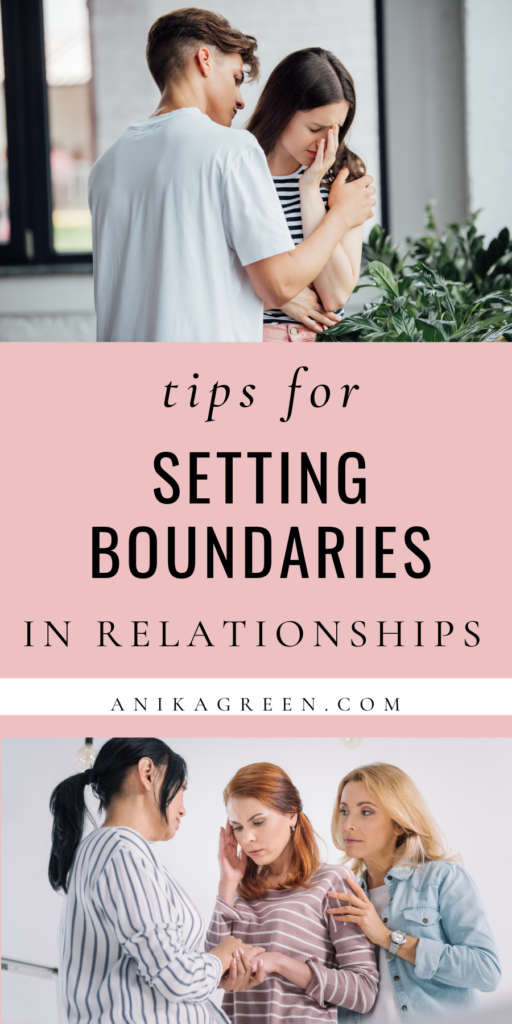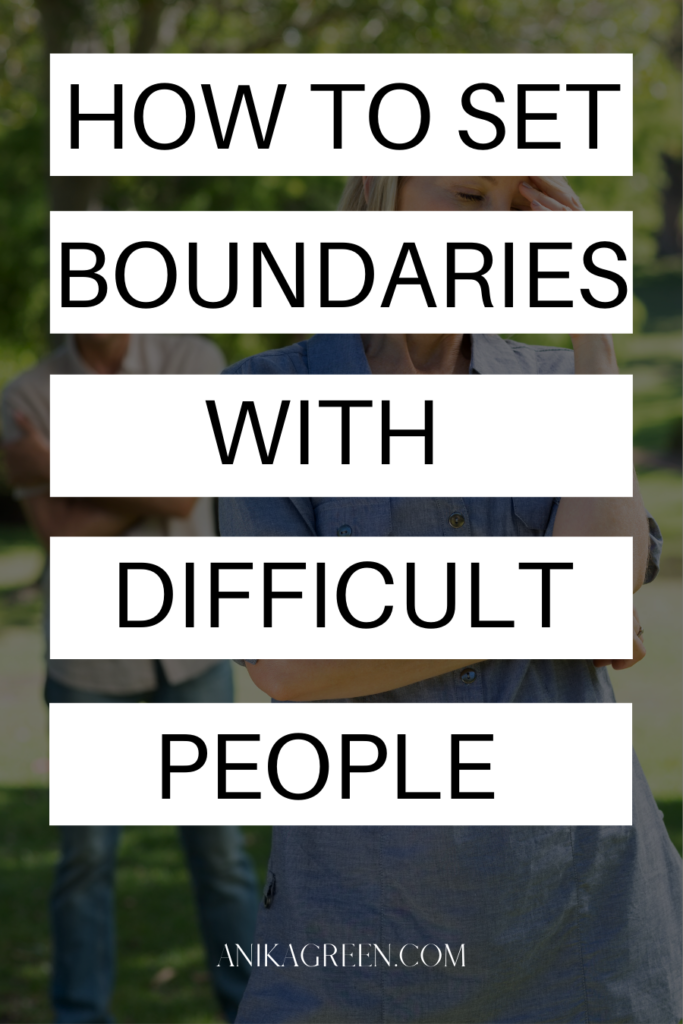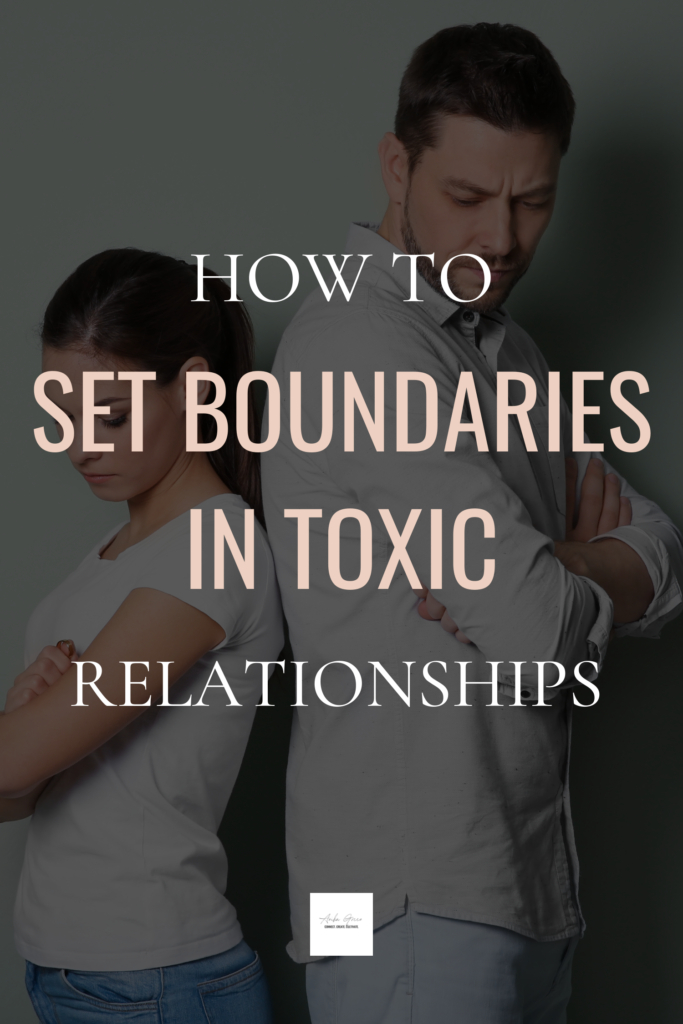How to Set Boundaries | If you’ve ever been in a serious relationship, complicated friendship, or dealt with a toxic family member, you’re likely well aware of the importance of setting boundaries. Being clear, concise, and honest about how you’re feeling, what you need, and what exactly you’re willing to put up with.
Learning to set boundaries isn’t easy — it’s not something that most of us start out comfortable with. But it’s a necessary skill in order to have healthy relationships and be able to thrive.
I’m a huge fan of conflict resolution & learning to work through things with people. I firmly believe that the healthy way to set boundaries is to sit down with someone, express your thoughts clearly and humbly, define boundaries together, and hold to them.
Read more on relationships & intentional living here.
This post contains affiliate links. If you choose to purchase items through these links, I may receive a small commission at no cost to you.

How to Set Boundaries
Be honest with yourself
Questions to ask
- What is bothering me?
- How is this harming me?
- What would a healthy version of this relationship look like?
- How have you contributed to the unhealthy nature of the relationship?
In order to set a boundary, you need to figure out exactly what the issue is. What is bothering you about this situation? What is harming you or your mental health?
Figure out what healthy looks like in this relationship, even if that means taking a step back from it. Identify specifically what needs to change. For example:
Example Situations
“This person expects me to be available to them 24/7, so we need to set a boundary regarding expectations of availability and time spent together. I have other priorities, and it’s not healthy for me to dedicate all of my energy to this one person.”
“I’m bothered by the way this person speaks to me. They take authority they don’t have to comment, criticize, or negatively speak about my person and my life choices. We need a boundary regarding how we speak about each other. It would be healthy for them to ask questions, and if they feel the need, offer suggestions rather than sweeping declarations.”
“This person overshares with me about their life and experiences. It’s inappropriate, and I am uncomfortable with it, we need to set a boundary over what we tell each other, and maybe take a bit of space from our relationship.”
These aren’t conversation suggestions — this is just for you. Get real with yourself about what’s bothering you. Something I’ve found really useful is writing out everything I’m thinking and feeling as a letter (but not sending it). It can provide a really good framework for sitting down to talk to someone, and helps you verbalize what the problem is.
How may you have contributed?
Find courage to be vulnerable. Most likely, this isn’t all on one person. That doesn’t mean you’re to blame, but take responsibility for not setting boundaries earlier, for letting things escalate. If you’ve enabled certain behaviours, notice it, so you can avoid doing it in the future.
Define what boundaries you want to set boundaries before sitting down
Questions to ask
- What am I comfortable with?
- Where can I compromise?
- What do I need to protect?
- What is the ideal outcome?
The most effective way to set boundaries is a face to face conversation. Not a fight, not a roast, but a genuine back and forth dialogue about the changes you need to make. (Note: not all conversations on boundaries go smoothly. That’s okay, and not unexpected. But show up ready to talk, not just prepared to critique or tell off.)
Before sitting down together, reflect on all you’ve specified and take some time to answer these questions. What are you comfortable with in this relationship?
What is it that you’re trying to save or protect about the relationship? If you can’t find anything, you may need to walk away altogether — but if you’re attempting to salvage something good, then remember that going in.
Show up humble
- Identify ways you may have contributed
- Don’t come in for catharsis
- What do you want from the conversation?
Setting boundaries is not an excuse to cathart. If you’re angry, and you need to let off steam, do so beforehand. Don’t show up angry and ready to shove your pain down someone’s throat. It’s not productive, will get you nowhere — and is just unkind.
More often than not, the people you’re setting boundaries with will have no idea they crossed a line, or just how much it hurt you. That likely wasn’t their intention. Offer them the benefit of the doubt. Take responsibility for ways you’ve added to the issue. It protects you from seeming condescending, and gives them nothing to call you out on.
One of my favourite books, all-time best on conflict resolution, Crucial Conversations talks about how important it is to know your motive going in. What do you want to walk away with?
Peace of mind, clarity, mutual understanding, a feeling of safety, stability in your relationship… only you know what it is. But make sure you do know, and structure your conversation around this goal.
Hold the boundaries you set
- Be okay saying no
- Change them if you need to
Next, hold your boundaries. If they’re being pushed, don’t ignore it. Once you’ve talked to this person, particularly if it’s been more than once, and they’re continually overstepping with no blatant self-awareness or apologies, you may need to consider taking a step back.
If someone really cares about you, they will be willing to sacrifice for your comfort and relational safety. However, if crossing the line becomes a pattern, it’s blatant disregard for you. And it’s time to walk away, even if just for a while.
Have grace
Finally… try not to be overcritical. If problematic patterns are longstanding in your relationship, it may take a bit to adjust to them. Offer grace when you see failed attempts. If they’re trying, be thankful that they’re trying. Feel free to remind them, gently correct, or clarify, but don’t set boundaries with one foot out of the door and prepare yourself to run at any sign of imperfection.
Don’t let fear or awkwardness of an uncomfortable conversation keep you from building a strong, healthy bond with someone. Speaking from experience, it feels like a huge win to have a productive conversation about boundaries, and I walk away feeling confident, strong, and happier than I was before. No one can read your mind, so you sometimes just have to ask for what you need.
I believe in you! You’ve totally got this.




Comments Off on How to Set Boundaries in a Healthy Way